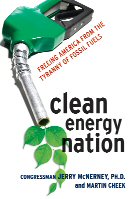SEJournal Online is the digital news magazine of the Society of Environmental Journalists. Learn more about SEJournal Online, including submission, subscription and advertising information.

BookShelf
Clean Energy Nation: Freeing America from the Tyranny of Fossil Fuels
By Jerry McNerney and Martin Cheek
AMACOM/American Management Association, $27.95
Reviewed by JIM MOTAVALLI
In 2007, Newt Gingrich wrote a book called A Contract with the Earth, which called for a new type of conservative environmentalism because the green groups stood for “litigation, regulation, taxation, bureaucracy.” He declared, “Free enterprise is not the enemy of the environment; it is the engine that will drive promising alternatives to failed practices.”
Weighted down by internal contradictions, the book didn’t go anywhere.
These days, Gingrich wants to dismantle the U.S. EPA in favor of a new agency that focuses on “what do we need to do today to get a better environment that also gets us a better economy.”
That’s the central paradox of environmental books written by numerous politicians: They’re often forced to declare that sustainability equals growth, ignoring some of the colder realities dictated by Mother Nature.
Clean Energy Nation: Freeing America from the Tyranny of Fossil Fuels by U.S. Rep. Jerry McNerney (D-CA) and journalist Martin Cheek is a much better book than Gingrich’s Contract, but it’s also shaped by politics. It makes a strong case for why green energy is good for America, but underestimates the hurdles that stand in its way.
The book is full of hopeful nuggets like this one: “A fleet of 10,000 hybrid delivery trucks, for example, would save 7.2 million gallons of diesel fuel a year for FedEx, reducing America’s oil consumption and saving the company money.” Undoubtedly, but then why does FedEx actually have only 365 hybrid vans out of a fleet of 75,000 vehicles?
There’s some inconvenient truth here. Fuel costs aren’t, as the Wall Street Journal reported, “a big weight on [the FedEx] balance sheet.” Hybrid trucks cost a lot more up front, so big companies such as UPS and FedEx tend to buy them when they get federal subsidies. That’s exactly the kind of political largesse targeted by the Tea Party and the politicians elected in its name.
The bankruptcy of solar producer Solyndra, which secured $535 million in U.S. Department of Energy loan guarantees, was a rallying point for Republicans in the House, many of them elected in the 2010 midterms. It was an Obama failure and a campaign opportunity. Perhaps Tesla Motors or Fisker Automotive — green car companies that received hundreds of millions in federal loans — will, they hope, be next. Understanding that helps explain why the conservative blogosphere wants the General Motor gas-electric Volt, the recipient of Obama Administration subsidies, to fail.
Clean Energy Nation calls for a “patriotic partnership,” the kind that existed when (of all people) Richard Nixon was in the White House.
“Great American leaders at all levels of government know the necessity of moving beyond their ideology to achieve great outcomes,” the authors wrote. “It is probably not possible to entirely end our reliance on petroleum and fossil fuels, but we can certainly enact programs that give the proper incentives to become more energy efficient …”
That seems like wishful thinking. There was a brief window when such legislation could get passed, but bringing it back would seem to require hard-nosed and targeted strategic thinking that’s beyond the scope of this book. We get vague pronouncements along the lines of, “Our nation’s people must become passionate about taking actions toward solving our energy challenges.” But how are we going to get there when “drill, baby, drill” is a simplistic political mantra, and a decreasing percentage of said citizens believe that climate change is even real?
Politics aside, there’s a lot of value in Clean Energy Nation.
The book is clearly written and well documented, and it acquits itself well in explaining how we got addicted to oil. It’s a useful primer in the basics of solar, hydrogen, wind, nuclear, geothermal and biofuels. It explains how our energy choices affect education, agriculture and America’s overall health. Readers come away from reading McNerney and Cheek entirely convinced of the need to abandon more than a century of fossil fuel dependence. But making that happen is the hard part, and the book isn’t much help there.
Jim Motavalli is the author of High Voltage: The Fast Track to Plug in the Auto Industry (Rodale) and a contributor to the New York Times, National Public Radio’s “Car Talk,” Mother Nature Network and PlugInCars.com.
* From the quarterly newsletter SEJournal, Spring 2012. Each new issue of SEJournal is available to members and subscribers only; find subscription information here or learn how to join SEJ. Past issues are archived for the public here.












